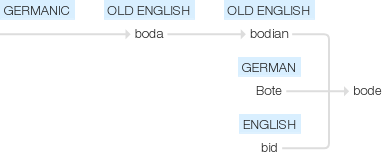Bode
Old English bodian ‘proclaim, foretell’, from boda ‘messenger’, of Germanic origin; related to German Bote, also to bid1.
wiktionary
Verb from Middle English boden, from Old English bodian(“announce, foretell”), from Proto-Germanic *budōną(“to proclaim, announce, lere, instruct”), from Proto-Indo-European *bʰewdʰ-(“to be awake, perceive fully”). See bid.
Noun from Middle English bod, from Old English bod, from Proto-Germanic *budą(“message, offer”).
Since 1740 also a shortening of forebode.
From Middle English bod, from Old English bod(“a bidding”), from Proto-Germanic *budą(“a bidding, offer”).
Cognate with Swedish bud, Dutch bod, Icelandic boð, Faroese boð, Norwegian Nynorsk bod, Norwegian Bokmål bud. Compare also Old Saxon gibod, German Gebot. See bid.
From Middle English bode, from Old English boda(“messenger, forerunner”), from Proto-West Germanic[Term?], from Proto-Germanic *budô(“messenger”). Cognate with Dutch bode(“messenger, harbinger”), German Bote(“messenger”).
From Middle English bod, abod(“a stopping”).
Inflected form of bide.
etymonline
bode (v.)
Old English bodian "proclaim, announce; announce beforehand, foretell," from boda "messenger," probably from Proto-Germanic *budon- (source also of Old Saxon gibod, German gebot, Old Norse boð), from PIE root *bheudh- "be aware, make aware."
With good or ill, "give a (good or bad) portent or promise," late 14c. As a shortened form of forebode "presage" (usually something evil), it dates from 1740. Related: Boded; boding.
